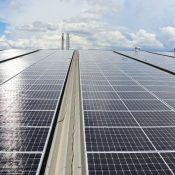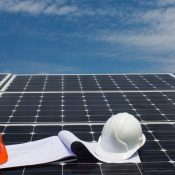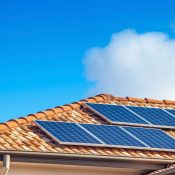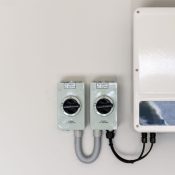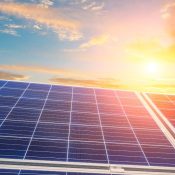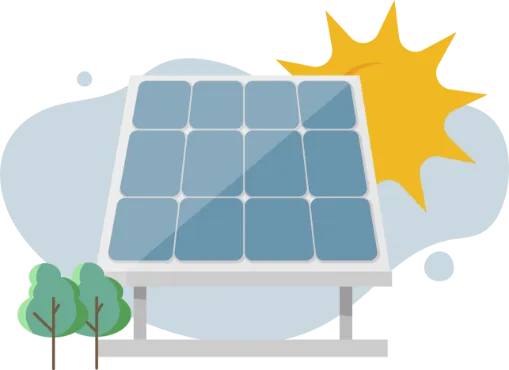Solar Farm Cost in Ireland
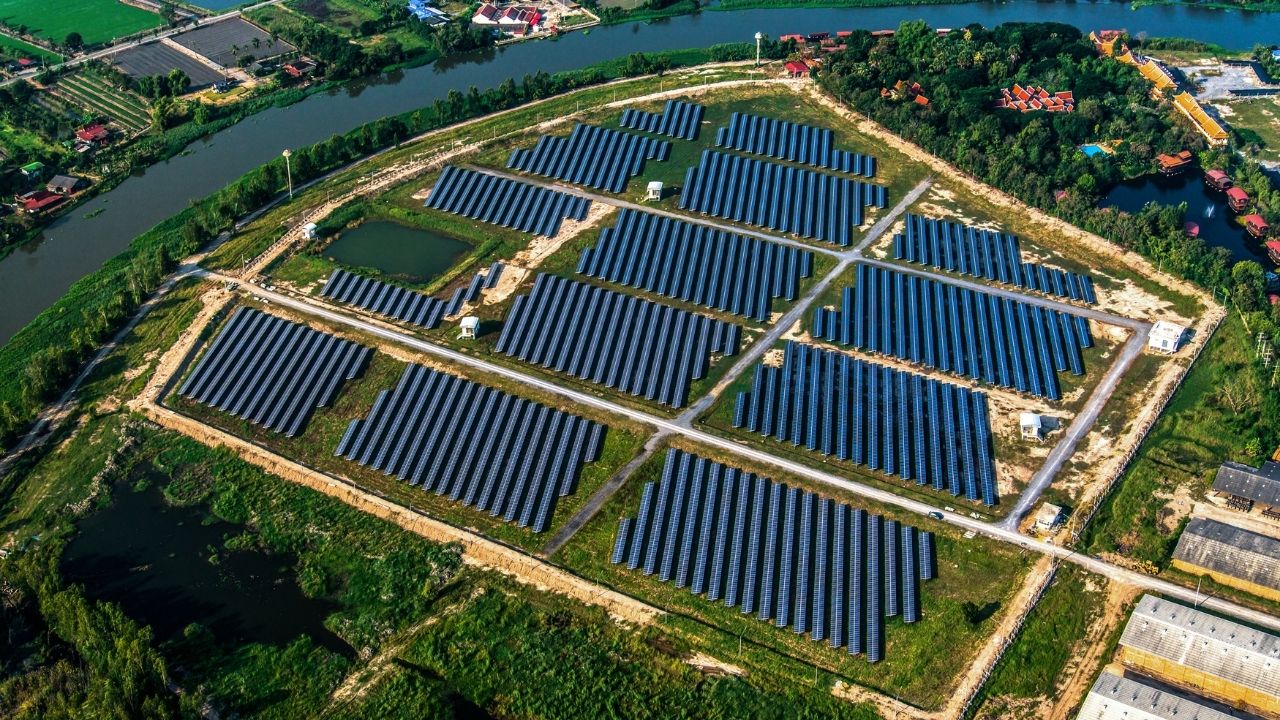
Have you ever wondered about the cost of setting up a solar farm in Ireland? The thought of investing around €6 million in a 5 MW solar power plant can be daunting!
This article aims to explore the complex factors that contribute to these costs while highlighting potential benefits and challenges for those considering such an investment.
So, get ready for a journey through the world of solar energy in Ireland!
What Are Solar Farms?
Solar farms are big fields full of solar panels. They take in sunlight and change it into electricity that we can use. Just like how a farm grows crops, a solar farm makes power from the sun’s light.
It’s kind of like planting energy! Solar farms can differ in size, but even a small one can make lots of power. For example, a typical park in Ireland has about 4,000 panels spread over four to five acres.
This much space gives us clean energy without burning coal or gas, which is good for our planet!
Energy production
Solar farms in Ireland are a great source of energy production. They use the power of the sun to generate electricity, which is then fed into the national grid. This renewable energy helps reduce our reliance on fossil fuels and contributes to a cleaner and greener future.
With over 4,000 solar panels spread across four to five acres, a typical solar farm can produce a significant amount of electricity.
The cost of developing a solar farm in Ireland can vary depending on factors such as land acquisition and installation expenses. Building a 5 MW solar power plant can cost around €6 million, including all the necessary equipment and construction costs.
However, there is government support available for research into solar PV in Ireland.
By investing in solar energy, we not only help protect the environment but also have the opportunity to earn income from our land. Solar farms provide an alternative income stream for farmers by leasing their land for this purpose.
Additionally, homeowners can benefit from reduced energy bills by installing solar panels on their roofs or participating in community-based projects.
Benefits
Solar farms in Ireland offer numerous benefits for homeowners. Firstly, they contribute to the production of clean and renewable energy, reducing greenhouse gas emissions and dependence on fossil fuels.
This is crucial for combating climate change and creating a more sustainable future. Solar farms also have the potential to generate income for landowners through leasing arrangements, providing an additional source of revenue.
Furthermore, by embracing solar energy, homeowners can take advantage of government grants and incentives that support the installation of solar panels on their own properties. These measures help reduce electricity bills and increase long-term savings.
Drawbacks
While solar farms in Ireland have numerous benefits, there are also some drawbacks to consider. One drawback is the high initial cost of setting up a solar farm, which can range from €800,000 to over €1.3 million for a typical installation.
This includes expenses such as land acquisition and the cost of solar panels. Another challenge is the limited number of solar panels allowed per farm, which could limit the energy production potential.
Additionally, construction challenges and public backlash may arise during the development process. Finally, there are concerns about the environmental impact of large-scale solar farms on local ecosystems.
Solar Farm Cost in Ireland
The cost of developing solar farms in Ireland can vary depending on several factors. Let’s delve deeper into the recent cost estimates and economic viability of small-scale solar farms in Ireland.
Read more to understand the potential costs and benefits of harnessing solar energy in the country.
Factors that contribute to cost
The cost of developing a solar farm in Ireland depends on several factors. One important factor is the size of the project. Developing a 5 MW solar power plant in Ireland can cost around €6 million.
The cost also includes factors such as land acquisition, where leasing land for solar farms can range from €800 to over €1,300 per acre.
Another factor that contributes to costs is the type and quality of solar panels used. High-quality panels tend to be more expensive but offer better energy production and durability in the long run.
Additionally, installation expenses, including labour and equipment, play a role in determining overall costs.
Government support and financial incentives are also significant contributors. Currently, there is support for research into solar PV in Ireland, which can help reduce costs for developers.
Moreover, homeowners looking to install solar panels can benefit from grants provided by the government.
Recent cost estimates
Developing a solar power plant in Ireland can be quite expensive. For example, constructing a 5 MW solar power plant can cost around €6 million. This includes factors like acquiring the land for the project.
These estimates give us an idea of the financial investment needed to implement solar energy projects in the country.
However, it’s important to note that there is government support and incentives available for research and development in this area, which can help make these projects more economically viable for homeowners who are interested in utilising solar energy for their own homes or small-scale farms.
Economic viability of small-scale solar farms
Small-scale solar farms have become increasingly popular in Ireland due to their economic viability. These smaller solar installations can provide a reliable source of income for homeowners and farmers alike.
With the cost of developing a 5 MW solar power plant ranging from €6 million, these smaller farms offer a more affordable option for those looking to invest in renewable energy. In fact, solar panel installations are now updated with a 0 percent VAT rate, making it even more financially appealing.
Additionally, grants are available for solar panel installations in order to further incentivize homeowners to embrace solar energy. With the potential for increased government support and the positive impact on income generation, small-scale solar farms are proving to be an economically viable choice for Irish homeowners.
Leasing Land for Solar Farms
Landowners in Ireland have the opportunity to generate potential income by leasing their land for solar farms.
Potential income for landowners
Landowners in Ireland have the potential to earn income from leasing their land for solar farms. Solar farms can provide a steady source of revenue for landowners through long-term contracts.
The rent per acre for solar farms in Ireland can vary, but it offers an opportunity for additional income without impacting existing agricultural activities. These contracts often include index-linking, which means that the rent increases with inflation over time.
By leasing their land for solar farms, landowners can diversify their income streams and contribute to renewable energy generation in Ireland.
Long-term contracts and index-linking
When it comes to leasing land for solar farms in Ireland, one advantage is the possibility of securing long-term contracts. These contracts can provide a stable income stream for landowners over an extended period of time.
In addition, some leases include index-linking, which means that the rent per acre will increase in line with inflation. This ensures that the rental income keeps pace with rising costs and maintains its value over time.
For farmers considering alternative land use options, such as solar energy, these long-term contracts and index-linking arrangements can offer financial stability and security for the future.
Alternative land use options for farmers
Farmers in Ireland have alternative options for using their land besides traditional farming. One option is leasing land for solar farms, which can provide a steady income per acre.
Solar farms typically consist of thousands of panels spread over several acres. By leasing their land to solar energy companies, farmers can earn money while contributing to the production of renewable energy.
Another advantage of leasing land for solar farms is the possibility of long-term contracts and index-linking, which ensures that the income from the lease remains stable over time.
Challenges and Considerations
Construction of solar farms in Ireland can face various challenges, including obtaining permits and approvals, navigating local regulations, and addressing potential issues such as soil erosion or disturbance to wildlife habitats.
Additionally, public backlash against large-scale solar projects can pose a challenge, with concerns about visual impact on the landscape and possible conflicts with other land uses.
Environmental considerations are also important, as proper management practices need to be implemented to minimise any negative impacts on biodiversity and ecosystem health. However, despite these challenges, there is great potential for solar energy to benefit farmers by providing additional income streams and reducing reliance on traditional agricultural practices.
Construction challenges
Building a solar farm in Ireland can come with its fair share of challenges. First, finding suitable land for the solar panels can be difficult. The size and orientation of the land need to be just right to maximise sunlight exposure and energy production.
Additionally, acquiring the necessary permits and approvals from local authorities can be a lengthy process.
Once construction begins, there may also be logistical challenges. Transporting the heavy equipment and materials needed for installation can be tricky, especially if the site is located in a remote area.
Weather conditions, such as strong winds or heavy rain, can also impact construction timelines.
Furthermore, connecting the solar farm to the electricity grid poses another challenge. This requires coordination with utility companies and ensuring that all technical requirements are met.
Public backlash
We understand that some people are concerned about the impact of solar farms on their communities. However, it’s important to note that public backlash is not a widespread issue in Ireland.
While there have been cases where local residents objected to the construction of solar farms due to visual impact or concerns over land use, these instances are relatively rare. In fact, many Irish homeowners recognize the benefits of solar energy and support the development of renewable resources.
It’s also worth mentioning that responsible solar farm developers take steps to address any potential environmental or community concerns through consultation and engagement with local stakeholders.
Environmental impact
Solar farms have a positive environmental impact in Ireland. By harnessing the power of sunlight, solar panels produce clean and renewable energy without emitting harmful greenhouse gases.
This helps to reduce our carbon footprint and combat climate change. Additionally, solar farms do not require water for operation, unlike traditional power plants that rely on water for cooling purposes.
This is especially beneficial for Ireland, a country known for its limited water resources. Solar farms also have the potential to support biodiversity by providing habitats for pollinators and wildlife underneath or around the panels.
The potential for solar energy to benefit farmers
Farmers in Ireland have a great opportunity to benefit from solar energy. By installing solar panels on their land, farmers can generate electricity and reduce their dependence on fossil fuels.
Solar energy is a clean and renewable source of power that can help farmers lower their energy costs and increase their sustainability. Additionally, the excess electricity generated by the solar panels can be sold back to the grid, providing an additional source of income for farmers.
This not only allows them to save money but also contributes to reducing carbon emissions and protecting the environment. With government support and grants available for solar panel installations, it’s an ideal time for farmers in Ireland to explore the potential of solar energy for their agricultural operations.
Take Action Towards a Sustainable Future!
The cost of developing a solar farm in Ireland can vary depending on factors such as land acquisition and size. While there are upfront expenses involved, solar farms have the potential to provide income for landowners and contribute to renewable energy production.
With government support and the increasing affordability of solar panels, small-scale solar farms may become more economically viable in Ireland. Overall, investing in solar energy presents an opportunity for both environmental sustainability and financial gain.
Why wait? Explore the potential of solar energy and make a difference to your environment and finances. Start your solar journey with us today!
Planning a switch to solar energy?
Contact Going Solar now and Get Free Advice & Quote Within Minutes!
Frequently Asked Questions
Contact Going Solar Now!
Joe Brennan
Founder @ Going Solar
Joe Brennan, the founder of Going Solar, is dedicated to making solar power mainstream in Ireland and meet SEAI objectives. With a focus on affordability and sustainability, he is bringing renewable energy solutions to homes, reducing costs & environmental impact.
Recent Posts

